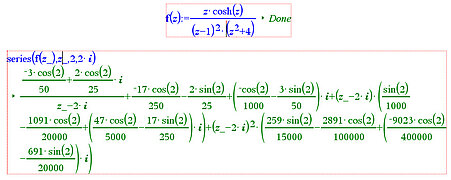TI-Nspire CAS in Engineering Mathematics: Line Integral: Residue Integration and Laurent Series
Complex analysis: Let f be a function of the complex variable z having a finite number of singularities consisting of isolated poles. Let C be a simple closed path in the complex plane ...
Autor: Michel Beaudin, T³ Europe
Fach: MINT
Schlagwörter
This document is about complex analysis stuff. Let f be a function of the complex variable z having a finite number of singularities consisting of isolated poles.
Let C be a simple closed path in the complex plane and let w(t), a ≤ t ≤ b, be a parametric representation of C.
We compute the line integral of f along C using three different methods.
First, the robust TI-Nspire CAS numerical integration (nint function) is used to compute the definite integral of f(w(t)).w'(t) with respect to t from a to b. The floating point answer will then be confirmed by using the theorem of residue. This will be done in two ways. We will compute the residue at each pole using a known formula from complex analysis - we program this formula in TI-Nspire CAS - and we will also use the series function in order to get the Laurent expansion of f about each pole.
One benefit is the following: we invoke the deformation theorem to replace any closed path enclosing the singularities by a circle whose parametric equation follows from complex exponential. Moreover, we show how to define a complex variable in TI-Nspire CAS. The top of the figure below shows the function used and the bottom part shows the Laurent expansion about the single pole z = 2i: the residue is the coefficient of 1/(z − 2i).

